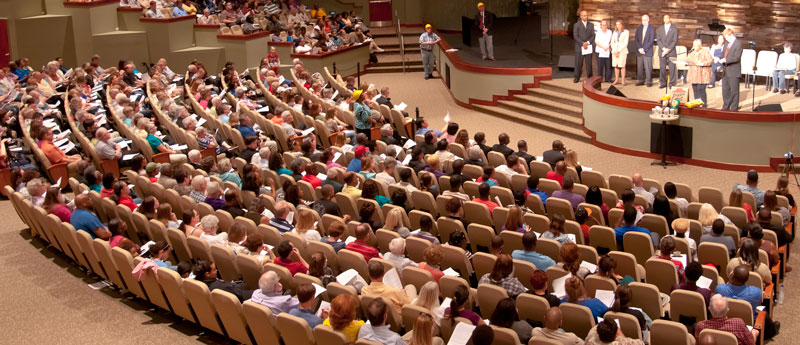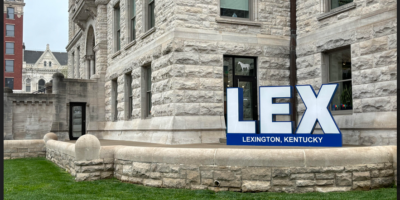By Ellen Deatrick

Crowds gather to hear local politicians at the tenth-annual Nehamiah Action Assembly. Photo by Dustin Pugel.
Many people can’t stand to leave things unchecked on a to-do list. Lexington’s BUILD (Building a United Interfaith Lexington through Direct-Action) is not like that. Tuesday, April 16 at their tenth-annual Nehemiah Action Assembly, 1659 people showed up to address three items on the to-do list. The same three that were on there the year before. And the year before: payday lending, affordable housing, and barriers to ex-offender reentry.
BUILD keeps issues on the list until they can rightly be checked off. Such an approach has kept pressure on community officials and has made significant progress on solutions proposed for some of the community’s most pervasive social justice concerns. As Reverend John List put it: “We [BUILD] will drive you crazy with our persistence.”
After an invocation that acknowledged there would be “no positive change without tension,” payday lending was the first problem on the docket. BUILD is advocating for legislation to end Kentucky’s current payday lending practices. According to BUILD’s research, payday lenders took $112 million in fees alone from borrowers in 2011 and put it in the hands of mostly out-of-state national payday companies.
Gail Swanson of Faith Lutheran Church, who briefed the crowd on the status of the payday problem, discussed the necessity of breaking down the rhetoric that keeps the payday lending circuit alive. Borrowers may need money for rent, groceries, or health care, but they certainly don’t need an advertised 14-day loan to turn into an average of 137 days of debt. As this is a state-wide crisis, BUILD has teamed up with CLOUT, its Louisville sister organization, and congregations in Frankfort to strategize for the 2014 legislative session.
Next up were the night’s specific action items. For these, BUILD had prepared key questions for LFUCG councilmembers who were invited to the event. Since 2008, BUILD has been asking councilmembers to establish an Affordable Housing Trust Fund (AHTF) for Lexington. Unarguably, BUILD’s research shows a need for affordable housing: over half of Lexington renters pay unaffordable rent each month (defined as more than 30 percent of their monthly income); 26 percent of renters in the city are forced to pay more than half of their income.
Five years later—two mayors, a commission, a $25,000 study, and a task force later—the AHTF still cannot get the council support it needs. Most recently, Mayor Jim Gray has lumped the issue with council’s work to fight homelessness. He is now creating an Office for Homelessness–and somehow believes this is a great stride in making Lexington homes more affordable.
Louisville saw the need, and they created a trust fund five years ago. Yet, Rachel Hurst from the Louisville Metro Affordable Housing Trust Fund, Inc., was at the Nehemiah Action to admit that “Louisville got something wrong.” Right now, the fund is struggling because the city did not establish a dedicated source of funding. Proponents of the Lexington AHTF see dedicated revenue as the key to success.
As the AHTF ordinance stands now, a .5% increase to the insurance premium tax (excluding health insurance) would generate $1.9 million for the fund, and would generate $21.5 million in economic activity for the city, including job creation. This would cost an average $15 annually for Lexington households. Councilmembers Chris Ford and Steve Kay said they would vote “yes” for the fund, as they have for years; however, Councilmembers Jennifer Mossotti and Peggy Henson replied “no.” They, along with several of their colleagues, need some convincing. But they’ve been warned: BUILD will drive them crazy with persistence.
The second action item—removing the ID barrier to ex-offender reentry—brought considerably more success for the evening. After generally looking at obstacles to successful reentry, BUILD decided to focus on IDs, a most essential part of functioning in society. Without an ID, one cannot get a job, rent an apartment, open a bank account, and many other daily responsibilities that may deter one from future crime. In Fayette County, obtaining an ID once released from the Detention Center has been a great hurdle in the past. Last year, 48 of 50 people who came to the Hope Center after time in corrections did not have an ID, BUILD has been told. Slow paperwork processing, and simply lack of money, keep IDs out of the hands of men and women looking to return to society.
Through research, BUILD found that Indiana’s Department of Corrections employs best practices for reissuing IDs. Rodney Ballard, the Director of the Fayette County Detention Center, and Vince Riggs, the Circuit Court Clerk, both attended the Nehemiah Action and agreed to travel to Indianapolis in the summer with BUILD to learn more about Indiana’s processes. Actually, Ballard agreed to send a reentry coordinator whom he plans to hire within the next months. All in all, it seems the officials are on board with BUILD—they want to see more successful reentries and have committed to making ID acquisition more feasible.
In summary: no check marks yet. None of these three issues are finished to BUILD’s satisfaction. There’s been progress, but there’s more work to do—some of it that promises to be quite grueling. But what’s important is that these issues aren’t just sitting on a list. They’re at the forefront for a significant number of Lexington community members who are fiercely advocating for their completion.




Leave a Reply